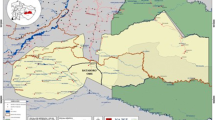Abstract
The varied, abrupt and amazing geography of the land of Peru is home of one of the major concentrations of indigenous peoples in the world. The asymmetry of power, however, in their relationship with the rest of society and the State is still very evident in their social exclusion, their gap in social and economic development, barriers in their access to health services as well as their marginalization and exploitation as subjects of health research. In this paper, we analyse two cases of research on indigenous populations in Peru, discuss them from the point of view of bioethics and reflect on important issues for researchers, research participants and the society, such as the need to respect different cultures, the need that the research being done is relevant to the needs of the population in which it is conducted and the necessity to empower indigenous communities in participatory research, to strengthen the institutions and to protect human rights, namely through ethics committees for research and the free, informed and meaningful informed consent. This approach should foster quality research, while at the same time fully respecting human rights and bioethics. We cannot forget that advancements in genetics, throughout the world, are very much in debt to indigenous populations.
Similar content being viewed by others
References
Arbour L, Cook D (2006) DNA on loan: issues to consider when carrying out genetic research with aboriginal families and communities. Community Genet 9:153–160
Brant Castellano M (2004) Ethics of aboriginal research. J Abor Health 1:98–114
Campbell TD (2014) A clash of paradigms? Western and indigenous views on health research involving aboriginal peoples. Nurse Res 21:39–43
Fajreldin V (2010) Problemas bioéticos de la investigación biomédica con pueblos indígenas de Chile (Bioethical problems in biomedical research with indigenous peoples in Chile, Spanish). Acta Bioethic 16:191–197
Freire P (1973) Pedagogy of the oppressed. Buenos Aires, Siglo XXI: 131
Harry D, Howard S, Lee Shelton B (2000) Indigenous people, genes and genetics. What indigenous people should know about biocolonialism. Indigenous Peoples Council on Biocolonialism, Nevada, USA. Available at: www.ipcb.org; accessed on: 13 Feb 2015
INEI (2010) Instituto Nacional de Estadística e Informática. Informe Técnico: Evolución de la pobreza en Perú al 2009 (National Institute of Statistics and Informatics. [Technical Report: Evolution of poverty in Peru to 2009]. Available at: censos.inei.gob.pe/DocumentosPublicos/Pobreza/2009/Infome_Pobreza.pdf; accessed on: 12 Feb 2015
INEI, UNFPA (2010) (Instituto Nacional de Estadística e Informática and Fondo de Población de Naciones Unidas. Perú: Análisis Etnosociodemográfico de las Comunidades Nativas de la Amazonía, 1993 y 2007 [National Institute of Statistics and Informatics and United Nations Population Fund. Peru: Socioethnographic Analysis of Native Communities in the Amazon]. Available at: proyectos.inei.gob.pe/web/biblioineipub/bancopub/Est/Lib0902/Libro.pdf; accessed on: 13 Feb 2015
Justo L (2004) Participatory research: a way to reduce vulnerability. Am J Bioethic 4:18–19
Justo L (2012) Genética y pueblos originarios, entre tensiones y propuestas. In: Penchaszadeh VB (ed) Genética y Derechos Humanos [Genetics and originary peoples, between tensions and proposals. In: VB Penchaszadeh (ed) Genetics and Human Rights] Buenos Aires, Paidós, 139–175
Law N° 29785 (2012) Ley del Derecho a la Consulta Previa a Los Pueblos Indígenas u Originarios reconocido en el Convenio 169 de la Organización Internacional del Trabajo (OIT). [Right to Previous Consultation to Indigenous or Originary Peoples recognized in Agreement 169 of the International Labor Organization]. Available at: www.mcultura.gob.pe/sites/default/files/docs/reglamento-de-la-ley-nro29785.pdf; accessed on: 12 Feb 2015
Mello MM, Wolf LE (2010) The Havasupai Indian tribe case. lessons for research involving stored biological samples. New Engl J Med 363:204–207
Ministerio de Cultura (2015) Base de datos de Pueblos Indígenas u Originarios [Database of Indigenous or Originary Peoples]. Available at: bdpi.cultura.gob.pe; accessed on: 12 Feb 2015
Montenegro R, Stephens C (2006) Indigenous health in Latin America and the Caribbean. Lancet 367:1859–1869
Quijano A (2010) Colonialidad del poder, eurocentrismo y América Latina. In: Lander E (ed) La colonialidad del saber: Eurocentrismo y ciencias sociales. Perspectivas Latinoamericanas. [Coloniality of Power. Eurocentrism and Latin America). In: Lander E (ed) Coloniality of Knowledge: Eurocentrism and Social Sciences. Latin American Perspectives] CLACSO, Consejo Latinoamericano de Ciencias Sociales, Buenos Aires, Argentina. Available at: bibliotecavirtual.clacso.org.ar/ar/libros/lander/quijano.rtf; accessed on: 13 Feb 2015
Schnarch B (2004) Ownership, Control, Access, and Possession (OCAP) or self-determination applied to research. A critical analysis of contemporary First Nations Research and some options for First Nations Communities. First Nations Centre, National Aboriginal Health Organization. J Abor Health 1:80–95
Tuhiwai Smith L (1999) Decolonizing methodologies. Research and indigenous peoples. Zed Editions, New Zealand
UNESCO (2005) Universal declaration on bioethics and human rights. http://portal.unesco.org/es/ev.php-URL_ID=31058&URL_DO=DO_TOPIC&URL_SECTION=201.html. Accessed 15 Feb 2007
WMA (2013) Declaration of Helsinki. http://www.wma.net/en/20activities/10ethics/10helsinki/index.html.pdf?print-media-type&footer-right=[page]/[toPage]. Accessed 15 Feb 2007
Zavaleta C, Fernández C, Konda K et al (2007) Short report: high prevalence of HIV and syphilis in a remote native community of the Peruvian Amazon. Am J Trop Med Hyg 76:703–705
Conflict of interest
The authors declare that they have no competing interests.
Compliance with ethical standards
This paper does not include research involving human participants and/or animals.
Author information
Authors and Affiliations
Corresponding author
Additional information
This article is part of the special issue on “Genetics and Ethics in Latin America”
Rights and permissions
About this article
Cite this article
Minaya, G., Roque, J. Ethical problems in health research with indigenous or originary peoples in Peru. J Community Genet 6, 201–206 (2015). https://doi.org/10.1007/s12687-015-0240-6
Received:
Accepted:
Published:
Issue Date:
DOI: https://doi.org/10.1007/s12687-015-0240-6




